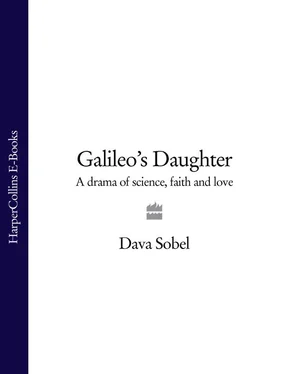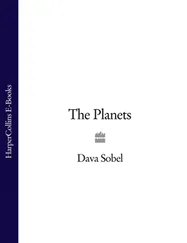Galileo’s Daughter
A drama of science, faith and love
Dava Sobel

To the fathers,
Galileo Galilei
&
Samuel Hillel Sobel, MD,
in loving memory
Cover Page
Title Page Galileo’s Daughter A drama of science, faith and love Dava Sobel
PART ONE To Florence PART ONE To Florence
[I] She who was so precious to you
[II] This grand book the universe
[III] Bright stars speak of your virtues
[IV] To have the truth seen and recognised
[V] In the very face of the Sun
[VI] Observant executrix of God’s commands
[VII] The malice of my persecutors
[VIII] Conjecture here among shadows
PART TWO On Bellosguardo
[IX] How our father is favoured
[X] To busy my self in your service
[XI] What we require above all else
[XII] Because of our zeal
[XIII] Through my memory of their eloquence
[XIV] A small and trifling body
[XV] On the right path by the grace of God
[XVI] The tempest of our many torments
PART THREE In Rome
[XVII] While seeking to immortalise your fame
[XVIII] Since the Lord chastises us with these whips
[XIX] The hope of having you always near
[XX] That I should be begged to publish such a work
PART FOUR Care of the Tuscan Embassy, Villa Medici, Rome
[XXI] How anxiously I live, awaiting word from you
[XXII] In the comfort of the Holy Office of the Inquisition
[XXIII] Vainglorious ambition, pure ignorance and inadvertence
[XXIV] Faith rested in the miraculous Madonna of Imprueta
[XXV] Judgment passed on your book and your person
PART FIVE At Siena
[XXVI] Not knowing how to refuse him the keys
[XXVII] Terrible destruction on the feast of San Lorenzo
[XXVIII] Recitation of the penitential psalms
[XXIX] The book of life, or, A prophet accepted in his own land
PART SIX From Arcetri
[XXX] My soul and its longing
[XXXI] Until I have this from your lips
[XXXII] As I struggle to understand
[XXXIII] The memory of the sweetnesses
IN GALILEO’S TIME
FLORENTINE WEIGHTS, MEASURES, CURRENCY
BIBLIOGRAPHY
NOTES
APPRECIATION
INDEX
About the Author
Praise
Copyright
About the Publisher
PART ONE To Florence
[I] She who was so precious to you
MOST ILLUSTRIOUS LORD FATHER
WE ARE TERRIBLY SADDENED by the death of your cherished sister, our dear aunt; but our sorrow at losing her is as nothing compared to our concern for your sake, because your suffering will be all the greater, Sire, as truly you have no one else left in your world, now that she, who could not have been more precious to you, has departed, and therefore we can only imagine how you sustain the severity of such a sudden and completely unexpected blow. And while I tell you that we share deeply in your grief, you would do well to draw even greater comfort from contemplating the general state of human misery, since we are all of us here on Earth like strangers and wayfarers, who soon will be bound for our true homeland in Heaven, where there is perfect happiness, and where we must hope that your sister’s blessed soul has already gone. Thus, for the love of God, we pray you, Sire, to be consoled and to put yourself in His hands, for, as you know so well, that is what He wants of you; to do otherwise would be to injure yourself and hurt us, too, because we lament grievously when we hear that you are burdened and troubled, as we have no other source of goodness in this world but you.
I will say no more, except that with all our hearts we fervently pray the Lord to comfort you and be with you always, and we greet you dearly with our ardent love.
FROM SAN MATTEO, THE 10TH DAY OF MAY 1623.
Most affectionate daughter,
S. Maria Celeste
The day after his sister Virginia’s funeral, the already world-renowned scientist Galileo Galilei received this, the first of 124 surviving letters from the once-voluminous correspondence he carried on with his elder daughter. She alone of Galileo’s three children mirrored his own brilliance, industry and sensibility, and by virtue of these qualities became his confidante.
Galileo’s daughter, born of his long illicit liaison with the beautiful Marina Gamba of Venice, entered the world in the summer heat of a new century, on 13 August 1600 – the same year the Dominican friar Giordano Bruno was burned at the stake in Rome for insisting, among his many heresies and blasphemies, that the Earth travelled around the Sun, instead of remaining motionless at the centre of the universe. In a world that did not yet know its place, Galileo would engage this same cosmic conflict with the Church, treading a dangerous path between the Heaven he revered as a good Catholic and the heavens he revealed through his telescope.
Galileo christened his daughter Virginia, in honour of his ‘cherished sister’. But because he never married Virginia’s mother, he deemed the girl herself unmarriageable. Soon after her thirteenth birthday, he placed her at the Convent of San Matteo in Arcetri, where she lived out her life in poverty and seclusion.
Virginia adopted the name Maria Celeste when she became a nun, in a gesture that acknowledged her father’s fascination with the stars. Even after she professed a life of prayer and penance, she remained devoted to Galileo as though to a patron saint. The doting concern evident in her condolence letter was only to intensify over the ensuing decade as her father grew old, fell more frequently ill, pursued his singular research nevertheless, and published a book that brought him to trial by the Holy Office of the Inquisition.
The ‘we’ of Suor Maria Celeste’s letter speaks for herself and her sister, Livia – Galileo’s strange, silent second daughter, who also took the veil and vows at San Matteo to become Suor Arcangela. Meanwhile their brother, Vincenzio, the youngest child of Galileo and Marina’s union, had been legitimised in a fiat by the grand duke of Tuscany and gone off to study law at the University of Pisa.
Thus Suor Maria Celeste consoled Galileo for being left alone in his world, with daughters cloistered in the separate world of nuns, his son not yet a man, his former mistress dead, his family of origin all deceased or dispersed.
Galileo, now fifty-nine, also stood boldly alone in his world-view, as Suor Maria Celeste knew from reading the books he wrote and the letters he shared with her from colleagues and critics all over Italy, as well as from across the continent beyond the Alps. Although her father had started his career as a professor of mathematics, teaching first at Pisa and then at Padua, every philosopher in Europe tied Galileo’s name to the most startling series of astronomical discoveries ever claimed by a single individual.
In 1609, when Suor Maria Celeste was still a child in Padua, Galileo had set a telescope in the garden behind his house and turned it skywards. Never-before-seen stars leaped out of the darkness to enhance familiar constellations; the nebulous Milky Way resolved into a swath of densely packed stars; mountains and valleys pockmarked the storied perfection of the Moon; and a retinue of four attendant bodies travelled regularly around Jupiter like a planetary system in miniature.
‘I render infinite thanks to God’, Galileo intoned after those nights of wonder, ‘for being so kind as to make me alone the first observer of marvels kept hidden in obscurity for all previous centuries.’
Читать дальше













